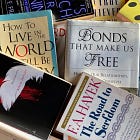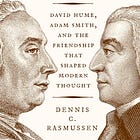David Hume, Session 2: Finding Strength of Mind
Don't rely on logic to fight passion when it comes to controlling your desires.
I am touched by this generous note from my newest paid subscriber:
I always return to self-learning in a more structured manner when going through - or rather growing through - new phases of life. Your writing is clear and straightforward on one hand, while being inspiring and uplifting on the other. It has kindled in me a desire for another round of stepping outside of my comfort zone under the guidance of a wise and thoughtful leader.
We are still early in our Classical Wisdom studies. David Hume, Adam Smith, Epictetus, and Ralph Waldo Emerson are among the greatest guides to living well in humanity’s history. As a paid supporter, you receive my curation and integration of their works, the wisdom of those in the Mindset Shifts U community, plus access to all past sessions of Mindset Shifts U.
This past February, we revisited Viktor Frankl’s categorical imperative: “Live as if you were living already for the second time and as if you had acted the first time as wrongly as you are about to act now!" A categorical imperative is a moral principle an individual chooses to follow regardless of circumstances.
Still, any day we might go against Frankl’s advice. We can be so caught up in our experience of life that it seems we hardly have a choice at all.
In Hume, Part 1, we looked at how suffering stems from identifying with our thoughts and self-concept. There is a narrator in our head, and we often find ourselves on both sides of the conversation.
In a meeting on a contentious issue, a colleague said, “I’ve spoken with myself and I agree with myself.” The colleague was not trying to be funny.
How often do we take our thoughts, sensations, perceptions, impressions, and feelings to be who we are? But Hume helped us see we are more than all that.
Understanding Hume’s insight is quite liberating, but we can’t reason ourselves to this experience of inner freedom.
Emotional freedom may not yet be in our sight. Hume provides a clear metaphor for the human tendency to double down and up the ante after making a mistake:
Methinks I am like a man, who having struck on many shoals, and having narrowly escaped shipwreck in passing a small frith, has yet the temerity to put out to sea in the same leaky weather-beaten vessel, and even carries his ambition so far as to think of compassing the globe under these disadvantageous circumstances.
Hume was not posturing when he wrote, “When I turn my eye inward, I find nothing but doubt and ignorance.” He asked this question: “For with what confidence can I venture upon such bold enterprises, when beside those numberless infirmities peculiar to myself, I find so many which are common to human nature?”
It’s no surprise that Hume was a man of radical humility. Of himself, he wrote, “My memory of past errors and perplexities, makes me diffident for the future. The wretched condition, weakness, and disorder of the faculties, I must employ in my enquiries, encrease my apprehensions.”
Hume instructs, “If we assent to every trivial suggestion of the fancy; beside that these suggestions are often contrary to each other; they lead us into such errors, absurdities, and obscurities, that we must at last become ashamed of our credulity.”
How gullible we are to believe our stream of thinking. How embarrassed we’d be if others could read our mind and see we are defending a self-concept born out of certainty in the accuracy and permanency of our perceptions.
Passing impressions may lead us astray. The guidance we need is found in principles and values. Hume advised himself and us, “I am uneasy to think I approve of one object, and disapprove of another; call one thing beautiful, and another deformed; decide concerning truth and falsehood, reason and folly, without knowing upon what principles I proceed.”
Hume helps us realize we may not be interpreting our world correctly for “there is no impression constant and invariable.” With that understanding, we can avoid being swept up in irrational impulses and find ourselves following Frankl’s advice more often.
If people understood that their every fanciful thought wasn’t a call to action, wouldn’t our lives go more easily?
Yet like my colleague, most of us blunder through life, arrogantly unaware of the passions that drive us. We are sure reason governs us. Ever humble, Hume wouldn’t laugh at us. If we were open to it, he might invite us to sit down with him and consider his life-changing ideas. He wrote,




